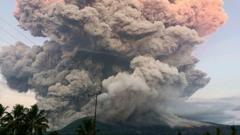President Trump intensified the rhetoric against Iran, demanding its unconditional surrender during a critical national security meeting amid rising tensions from Israel's offensive campaign targeting Iranian military and nuclear facilities. As evacuations heighten in Tehran, the U.S. must weigh its involvement in a conflict that threatens regional stability.
Trump Demands Total Surrender from Iran as Military Tensions Escalate

Trump Demands Total Surrender from Iran as Military Tensions Escalate
As Israel expands its military campaign against Iran, President Trump calls for Iran's "unconditional surrender," hinting at possible U.S. military involvement in the conflict while calling for major attacks on Iranian nuclear sites.
---
Current time in Jerusalem 10:44 p.m. June 17 Tehran 11:14 p.m. June 17 Live Updated June 17, 2025, 3:38 p.m. ET
In a shocking escalation of rhetoric and military engagement, President Trump has issued a demand for "unconditional surrender" from Iran, indicating a potential U.S. military involvement in the conflict as Israel continues its offensive operations. In recent social media posts, Trump specifically threatened Iran’s supreme leader, hinting that the U.S. may leverage significant military might against Iran’s critical infrastructure.
The backdrop of this announcement follows recent Israeli airstrikes, which caused widespread destruction, including the targeting of military command centers and nuclear sites within Iran. Experts have indicated that these operations, purportedly aimed at curbing Iranian nuclear capabilities, may also be striving towards destabilizing the Iranian regime altogether.
As Israeli bombardments intensify, Iranians are fleeing major urban centers like Tehran, following military orders to evacuate certain northeastern regions perceived as potential strike zones. Eyewitness accounts indicate long queues for gasoline as residents scramble to find safety amidst the panic.
In a related development, Trump has expressed his growing impatience with Iran, dismissing negotiations in favor of what he terms a “real end,” indicating he seeks dramatic outcomes rather than temporary armistices. Meanwhile, reports from Tehran suggest a chilling atmosphere, with internet access crumbling under state control measures to limit the dissemination of information regarding the ongoing attacks.
The national security meeting in Washington signals a pivotal moment as U.S. officials weigh options that could expand American operations, including possible air support for Israeli jets aiming to dismantle deeply buried nuclear facilities such as Fordo.
Throughout the day, the Israeli military has communicated its resolve to maintain pressure on Iran, asserting that significant military capabilities remain at the nation’s disposal to inflict damage on Iranian assets. The growing conflict echoes ramifications of previous wars in the Middle East, raising concerns about wider regional involvement and humanitarian crises stemming from escalating violence.
As events unfold, the calls for "complete control" over Iranian skies raise critical questions about the morality and strategic implications of any potential American military action, underscoring the complexities entwined within U.S. foreign policy in the region. The situation requires careful navigation to avoid a full-blown disaster as calls for regime change resonate within circles of power in both Israel and the United States.
Current time in Jerusalem 10:44 p.m. June 17 Tehran 11:14 p.m. June 17 Live Updated June 17, 2025, 3:38 p.m. ET
In a shocking escalation of rhetoric and military engagement, President Trump has issued a demand for "unconditional surrender" from Iran, indicating a potential U.S. military involvement in the conflict as Israel continues its offensive operations. In recent social media posts, Trump specifically threatened Iran’s supreme leader, hinting that the U.S. may leverage significant military might against Iran’s critical infrastructure.
The backdrop of this announcement follows recent Israeli airstrikes, which caused widespread destruction, including the targeting of military command centers and nuclear sites within Iran. Experts have indicated that these operations, purportedly aimed at curbing Iranian nuclear capabilities, may also be striving towards destabilizing the Iranian regime altogether.
As Israeli bombardments intensify, Iranians are fleeing major urban centers like Tehran, following military orders to evacuate certain northeastern regions perceived as potential strike zones. Eyewitness accounts indicate long queues for gasoline as residents scramble to find safety amidst the panic.
In a related development, Trump has expressed his growing impatience with Iran, dismissing negotiations in favor of what he terms a “real end,” indicating he seeks dramatic outcomes rather than temporary armistices. Meanwhile, reports from Tehran suggest a chilling atmosphere, with internet access crumbling under state control measures to limit the dissemination of information regarding the ongoing attacks.
The national security meeting in Washington signals a pivotal moment as U.S. officials weigh options that could expand American operations, including possible air support for Israeli jets aiming to dismantle deeply buried nuclear facilities such as Fordo.
Throughout the day, the Israeli military has communicated its resolve to maintain pressure on Iran, asserting that significant military capabilities remain at the nation’s disposal to inflict damage on Iranian assets. The growing conflict echoes ramifications of previous wars in the Middle East, raising concerns about wider regional involvement and humanitarian crises stemming from escalating violence.
As events unfold, the calls for "complete control" over Iranian skies raise critical questions about the morality and strategic implications of any potential American military action, underscoring the complexities entwined within U.S. foreign policy in the region. The situation requires careful navigation to avoid a full-blown disaster as calls for regime change resonate within circles of power in both Israel and the United States.






















